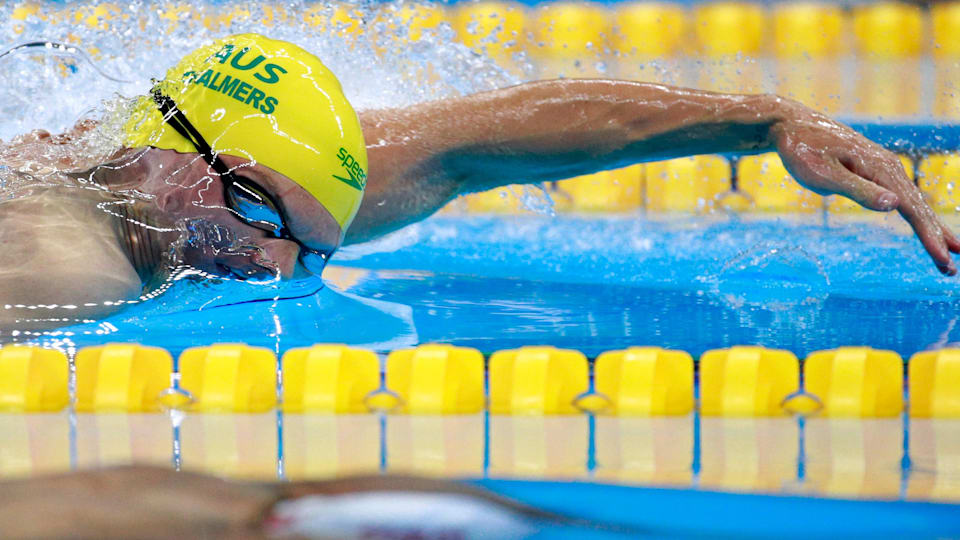Olympic champion Chalmers the epitome of positivity
Having overcome an ongoing heart condition to power his way to 100m freestyle gold at Rio 2016, it is little surprise to learn that Australian swimmer Kyle Chalmers is not allowing the current COVID-19 shutdown to cause him any unnecessary palpitations.

Three-time Olympic medallist and three-time Youth Olympic medallist Kyle Chalmers cannot wait to compete on sport’s biggest stage once again.
“It’s going to be such a massive celebration next year when the Olympics [do] go ahead and the world hopefully has got over this virus and we can all celebrate,” the freestyle specialist told olympic.org. “I’m really excited for that opportunity.”
The now 21-year-old announced himself on the global stage by winning the 100m freestyle at the Olympic Games Rio 2016, adding bronzes in the 4x100m freestyle and medley relays, and followed up with 4x200m freestyle relay gold at the FINA World Championships in the Republic of Korea in 2019.
But within weeks of that world title, Chalmers found himself on the operating table for the third time in five years, as surgeons looked to arrest a condition called supraventricular tachycardia (SVT).
“I was diagnosed with SVT when I was 12. Essentially, it’s a heartbeat that comes on out of control and can race up over 200 [beats per minute],” Chalmers explained.
“I had my first surgery as a 16-year-old in 2015, just before the World Championships in Kazan, and it was unsuccessful. I had it again in 2017 and it worked for about six months, but the problem came back, so I had surgery for a third time in August 2019.
“The episodes would come on very infrequently; you could never predict when. When they do come, you can’t control them. You go all dizzy and if you’re exercising there’s a possibility you could pass out in the pool.”
Chalmers suffered three such incidents during the 2019 World Championships, including one in the marshalling room ahead of his 200m freestyle semi-final.
“It [was] like doing a max heart-rate effort before I actually raced,” he said. “As soon as I got back from the world champs I was back in having surgery again.
“I haven’t had a problem since, so I’m hoping it’s no longer something I have to worry about.
“It’s always in the back of your mind when you’re waiting to race, but it’s also good to be able to show [other people who have the condition what] you can still achieve.”
With surgery firmly behind him, Chalmers’ gaze was firmly set on Tokyo 2020 and defending his Olympic title. But, like it has for the rest of the world, the coronavirus pandemic has forced a change of plans.
“When they announced the Olympics were going to be postponed for a year – rather than cancelled – it was a relief more than anything,” Chalmers said.
“The last four years [have] revolved around swimming fast in July. I knew I was in the best shape of my life. I was doing some great stuff in training and I was ready to launch into Tokyo 2020.
“[But] it would have been wrong of us as Olympians or the Olympic Games to put ourselves ahead of health.
“It’s such a massive thing. We need to band together and fight this virus.
“I’ve tried to look at all the positives. I’m going to be 22 turning 23 next year, a year further into my prime as a swimmer. When I get back in the pool I’m going to be hungrier than ever.
“After Tokyo there’s only three years until the next [Summer] Olympics, so that’s something else to look forward to.”
Working from home has become the new norm for many in recent weeks, and it is no different for high-performance athletes.
“I’ve got a good set-up at home,” Chalmers said. “I’ve got a bike and gym equipment, and we’re having lots of Zoom calls with our coaching staff.
“Your squad and coaches are like family. I spend more time with those guys than I do with my real family, so it’s nice spending an hour or two online with them each day, connecting and seeing how everybody is handling it.
“It’s going pretty well. I’ve replaced swimming with other physical activity, like bike riding or running, and we’re still doing gym, yoga and physio.
“I’m pretty adaptable so I’ve settled into this new lifestyle. It’s the norm for the time being.”
While the global spread of the coronavirus has limited the lives of many, Chalmers credits his enforced isolation with bringing a new passion for his sport.
“I’ve been using a 12-metre backyard pool, which is quite challenging. It’s about a quarter of the length of what I normally train in, so for me it’s about three strokes before you have to turn around and go back the other way.
“[But] it’s a big relief to be in the water. I’ve always thought that, as soon as I quit swimming [as a career], I’d never get back in the water, but as soon as it’s taken away by circumstance then it’s all you want to do. It’s what you love.”
